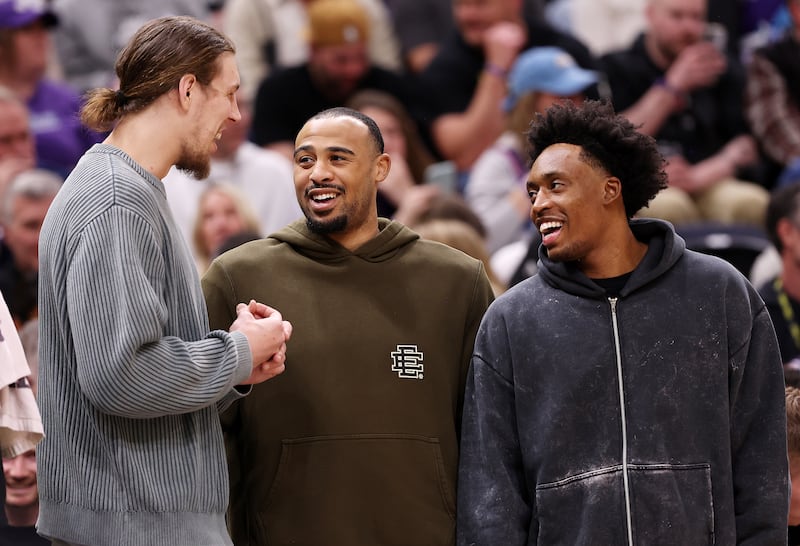Editor’s note: Eighth in a series evaluating and grading every player that was on the Jazz’s final 2022-23 roster.
I have to admit that it’s been difficult to evaluate Talen Horton-Tucker this year. I’ve spent more time thinking about his ceiling, his development and his potential than any other player and there isn’t another player on the Utah Jazz roster that I’ve gone back-and-forth on more.
Last month I wrote about some of the questions that need answering in order to determine what his future with the Jazz will look like, and I concluded that it could take part of next season to find true clarity on whether Horton-Tucker can be an NBA-level point guard.
But, this article isn’t about next season, it’s about what we saw this season.
Talen Horton-Tucker — Grade: C+
There’s an unfortunate spot that Horton-Tucker finds himself in because of his age and NBA experience. Because he is heading into his fifth NBA season and has been on a championship team and played with great players, there’s a certain level of understanding and wisdom that is expected from him. On the other hand, he is remarkably just 22 years old, so he needs to be given a little bit of grace where expectations are concerned.
Those two ideas are often in conflict when dealing with Horton-Tucker, especially when it comes to his maturity and decision-making. It often feels like he should know the difference between bad shots and good shots and that he should be able to run a team with a little more precision, and it can be frustrating when he takes bad shots and makes bad decisions. In those moments it’s hard to remember that he is younger than Udoka Azubuike and even rookie Ochai Agbaji, and that’s what I try to keep in mind when evaluating his season.
Overall, Horton-Tucker finished the year averaging 10.7 points, 3.8 assists, 3.2 rebounds and 1.9 turnovers while playing 20.2 minutes per game and shooting 41.9% overall and 28.6% from 3-point range.
I think it’s probably useful to include Horton-Tucker’s stats from his final 19 games of the season, which were the most consistent in terms of minutes and role (he started the final 15 games). In that stretch he averaged 17.3 points, 6.2 assists, 4.8 rebounds and 3.3 turnovers per game while shooting 43.1% overall and 32% from deep.
Though his numbers clearly increased and he was more efficient when he was given a larger role, it has to be noted that there were a number of higher-usage players injured throughout that stretch and Horton-Tucker likely wouldn’t have the same type of production if everyone was healthy.
To be perfectly honest, his shooting numbers just aren’t where they need to be for his position. If he isn’t going to be an average NBA shooter, he needs to take fewer 3-pointers and he needs to focus on finishing through contact rather than trying to finesse his shots around contact.
On the defensive side, Horton-Tucker has the frame and length and size that lends itself to a really successful defensive player, but there were times where he was just outplayed on that end either by opponents or teammates.
There’s so much to be excited about when it comes to Horton-Tucker. He has an incredible first step, he’s crafty in the lane, he’s strong and athletic and bouncy and long and has flashes of a player who can really make an impact.
There are also reasons to be concerned. His turnovers are not usually the kind that you’re willing to live with, he plays with his head down a little too much, he can be impatient and he doesn’t have the best pick-and-roll game. He also hasn’t shown that much improvement compared to his first three years in Los Angeles with the Lakers.
Though I’m grading him purely based on his 2022-23 performance, it’s impossible not to think about his future and how important next season will be for him.
Horton-Tucker has a player option for next season for $11 million. If he decides to pick that up, he’ll be playing for an extension. If he decides to opt out, which would surprise me, he’ll be a free agent and looking for a raise.
At this point, I don’t think it would be wise to give Horton-Tucker a bigger and longer contract. If I were the Jazz, I’d want more time with him to make a decision. Although this season it’s important to remember his age and give him some time to come into his own, I don’t think he’ll be given that same leniency next season. He needs to show growth, self-awareness, strength, and an ability to adapt and improve.
Maybe a middle-of-the-road grade seems like a cop out, but with how confused I am about Horton-Tucker, I feel like it’s the only reasonable answer.




